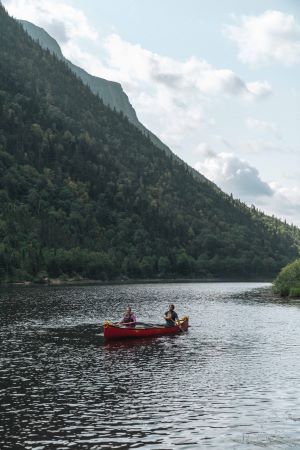Surrounded by the Canadian wilderness and chock-full of beauteous landscapes and natural resources, the Canadian province of Québec welcomes millions of tourists every year. But with high levels of tourism comes the potential for those natural resources to be damaged or destroyed completely.
According to the United Nations Environment Programme (UNEP), tourism can lead to a variety of problems for the local environment, including the consumption of key resources, the generation of waste, loss of biodiversity and more. This is why, according to UNEP, sustainability must begin to define tourism development in the coming years. And no destinations better embody these ideals of sustainable tourism than those found in Québec.
The destinations of Charlevoix and Québec City are not immune to these problems, so both destinations are taking strides to create and implement sustainability projects and initiatives. Check out some of these programs and learn how this focus on sustainability could affect your next meeting or event in the Great White North.
Charlevoix
Well known for local artisanal foods and winter tourism activities such as skiing, the Charlevoix region of Québec is also a UNESCO biosphere reserve, recognized for its unique biodiversity, iconic landscapes and engaged communities. It is part of the UNESCO Man and the Biosphere Programme, which has a network of over 700 sites in more than 120 countries. Charlevoix recognizes the importance of maintaining the sustainability of the region, which is why in April 2023, the destination launched a strategic action plan aimed at consolidating its commitment to sustainable development.

More than 800 people participated in constructing the goals of the action plan, more than half of which are local residents of the Charlevoix region. The action plan consists of three pillars of sustainable tourism: environment, social and economy. The goals of the action plan center around making tourism more beneficial to those in the local region and include encouraging more visitors who respect the region and its people, increasing the average length of stay in the region and generating more tourism traffic year-round and not just seasonally.
[Related: 5 Sustainability Trends in the Conventions Industry]

According to Tourisme Charlevoix, nearly 20% of the projects laid out in the action plan have already been completed, and over 60% of the projects are in progress.
While the destination itself is focused on maintaining its natural resources, visitors—both for leisure and business—are still encouraged to come and experience all of the natural beauty Charlevoix has to offer.
Seventy-five percent of those who visit the region do at least one hiking activity, whether in one of the cities or one of the national parks.
Saguenay–St. Lawrence Marine Park, for example, is a well-known and protected area of the St. Lawrence River and is the first park in all of Canada to protect a purely marine environment. The area covers over 450 square miles and protects more than 1,800 animal and plant species, including marine mammals like the blue whale and St. Lawrence beluga. Groups can go on guided tours of the region and see for themselves why this natural region of Québec is worth protecting for future generations.
A scenic and sustainable way to travel between Charlevoix and Québec City is the new hydrogen-powered train, transporting passengers along the St. Lawrence River. The energy comes from splitting water molecules to create a green, renewable source of hydrogen propulsion. The first train of its kind in the western hemisphere, the two-and-a-half-hour train ride offers mountain and river views and operates from June through September, also offering guided tours of the region.
Québec City
Québec City supports more than 550 events per year, ranging from small local events to large international ones. And much like Charlevoix, Québec City is committed to supporting sustainable travel and tourism, also creating a three-year action plan back in 2022, committing to enhancing the quality of life of local residents and guiding local businesses to shift to responsible and sustainable tourism practices.

The action plan also aims to protect the local environment and preserve the heritage of the local residents. The overall goal of the action plan is to shape Québec City into a leading reference for sustainable tourism in North America.
[Related: Destination Canada’s Legendary Winter Incentive Experience in Quebec City]

Some of the programs and projects announced in the action plan have already been put into effect in the destination. One of which is to offer free public transportation for visitors spending two or more nights in a participating hotel. These qualifying visitors receive an unlimited three-day pass for the entire Réseau de transport de la Capitale (RTC) bus network. The buses create a more eco-responsible way to see some of the biggest tourist draws in Québec City, including Old Québec, museums, Aquarium du Québec, shopping centers and more.
The city also launched a project called “Destination Jeunesse” in fall 2022 to allow the young people of the region to plan the tourism experiences of tomorrow. The project includes an advisory committee of six local young adults who help to provide a glimpse into the views and opinions of the next generation and how they would like to see Québec City implement sustainability programs so that it’s a sought-after destination for years to come.
Other initiatives announced in the three-year action plan include $500,000 of funding to help local businesses shift to sustainable tourism, offering an online carbon calculator and other sustainability information for visitors, helping to make cycling more accessible to people and more.
Québec City is also on track to become the world’s first French-speaking destination to obtain Biosphere sustainable certification, an internationally recognized certification that aligns with a destination’s own Sustainable Development Goals (SDGs) and the United Nation’s 2030 sustainability agenda. Many hotels and venues in the region already hold the Biosphere certification, including the Québec City Convention Centre, Auberge Saint-Antoine, Parc de la Chute-Montmorency and the Fairmont Le Château Frontenac. In total, 18 certified tourism businesses have received Biosphere certification, with an additional 50 that are in the process of receiving certification.
Historic & Sustainable Québec Hotels

Known as “the world’s most photographed hotel,” the Fairmont Le Château Frontenac in Québec City was the first historic hotel in Canada to achieve carbon neutrality in 2020. Before that, the hotel set up a program called “Château Boréal” in partnership with the forest research arm of Université Laval (Laval University), wherein a tree will be planted in the Montmorency Forest every time a guest at the property declined daily housekeeping. The hotel has also completely eliminated single-use plastic items, houses over 70,000 bees in its rooftop sanctuary and has made major renovations and investments to increase the energy efficiency of its building.
[Related: Historic Eastern Canada Event Venues That Feel Fit for Royalty]
Located in the heart of Québec’s Charlevoix region, the historic Fairmont Le Manoir Richelieu has also made major strides in sustainability in its 125-year history. The hotel integrates eco-responsible practices into nearly every aspect of its operations, including favoring local and seasonal food products, recycling solid soaps, using eco-responsible hospitality and cleaning products and utilizing electric leisure vehicles. The hotel is also part of the part of the UNESCO Environmental Recognition Programme and Charlevoix Biosphere Reserve. Fairmont Le Manoir Richelieu has also partnered with Hydromel Charlevoix to create a habitat for 10 beehives on the property, which help produce exclusive honey products and pollinate the surrounding wild flora.







